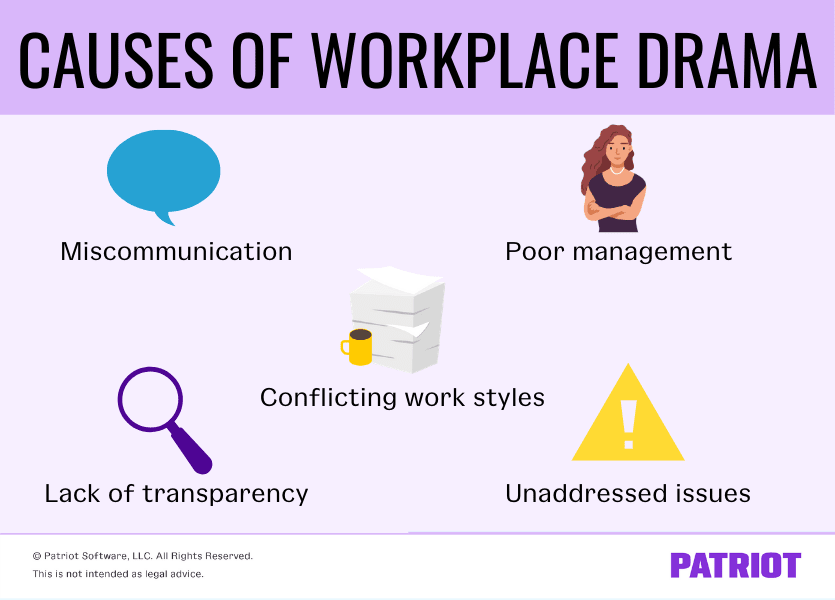Conflict in the workplace costs employers roughly $359 billion in paid hours each year. Yes, you read that right—$359 billion. But, what kinds of problems are causing businesses billions of dollars per year? We’ve pinpointed the main problems that cause unnecessary workplace drama. Read on to learn what problems you should keep your eyes peeled for and how to avoid them altogether.
Top 5 causes of workplace drama
Workplace drama can cost you a lot … and not just in money. Conflict in the workplace can lead to:
- Decreased productivity
- Turnover and termination
- Failed projects
- Absenteeism (25% of employees said that avoiding conflict led to absence from work)
- A toxic culture and work environment
- Low employee morale
At some point or another, you may find yourself dealing with employees who are butting heads. An unusual amount of conflict at work could be due to one of the five culprits below.
1. Lack of transparency
Having a business that prioritizes transparency is oh-so important. Transparency helps your team build trust and be open with one another. But without transparency, conflict could arise.
Drama thrives in secretive environments, like ones that lack openness between employees and management. And as the business owner, you are a role model when it comes to transparency. Instead of keeping things hidden from your employees, let your workers be the first ones to know. That way, everyone is kept in the loop. And, you can promote a culture of transparency instead of creating a culture of hearsay and secrecy.
2. Miscommunication
According to one study, 86% of employees and executives cite lack of collaboration or ineffective communication for workplace failures. If miscommunication is prevalent in your business, workplace drama may be creeping around the corner.
Communication is everything in business. Effective communication can work wonders for your company. Here are just a few perks of good communication:
- Boosts productivity and performance
- Keeps everyone on the same page
- Helps you avoid problems (e.g., issues with projects)
- Promotes growth
- Brings your team together
Communication can make or break your business’s success. To ensure your team members are effectively communicating with each other, you can encourage employees to ask questions, have a variety of communication channels (e.g., Slack), and be as clear as possible when communicating.
3. Unaddressed issues
Not addressing conflicts can cause them to snowball into bigger issues. And nobody wants that. Instead of ignoring problems in the workplace, catch and address them early on.
You or someone in management should address conflict—no matter how big or small the issue is. To properly address problems in the workplace, you can:
- Talk with employees one-on-one
- Host an open discussion with employees involved in the issue
- Listen to employees
- Come up with a solution and/or compromise
- Determine ways to avoid the same issue in the future
The sooner you address a problem, the quicker your team can resolve it and move on.
4. Poor management
Poor management is another culprit of workplace drama. In fact, a whopping 80% of employees have experienced poor management at some point in their career.
Poor managers typically exhibit some (or all) of the following behaviors:
- Doesn’t listen to employees
- Ignores questions or requests
- Micromanages
- Takes credit instead of giving it
- Plays favorites
- Rewards bad behavior
- Doesn’t trust team members
Poor management can quickly turn a positive work environment into a toxic one. Not to mention, it can severely damage employee morale and productivity. To avoid this problem from causing drama in your workplace, take a step back and make sure you (and/or your manager(s)) are not showcasing the bad behaviors from above.
5. Conflicting work styles
Every employee has a different work style. Some employees may be more organized and detail-oriented, while others may be more competitive and goal-oriented.
Of course, it’s good to have a mixture of different personalities and work styles in the workplace. But from time to time, it can cause conflict between employees— especially if one employee believes their way of doing things is better than another employee’s way.
In some rare cases, it may be too difficult for two employees to work together due to their conflicting styles. And when that occurs, it can cause a domino effect and impact the rest of the team, too.
When it comes to work styles, understand what does and does not work for each employee. That way, you can cater to their style and come up with solutions that work for everyone involved.

Creating a drama-free workplace
Dealing with workplace drama is easier said than done. But, it’s a necessary part of being an employer. And if you want your team to thrive, you need to tackle conflicts head-on.
Want to stop workplace drama dead in its tracks? Learn how to steer clear of workplace drama (and nip it in the bud if you find your workplace caught up in it) by following the tips below:
- Be on the lookout for common problems (ahem, see 1 – 5 above)
- Treat all employees equally
- Tackle drama early on
- Be inclusive
- Keep communication open
- Be as transparent as possible
- Model the behavior you want to see
- Have a system for managing conflict
Ending workplace drama and learning how to avoid it altogether can strengthen your team by improving productivity, employee morale, and collaboration.
